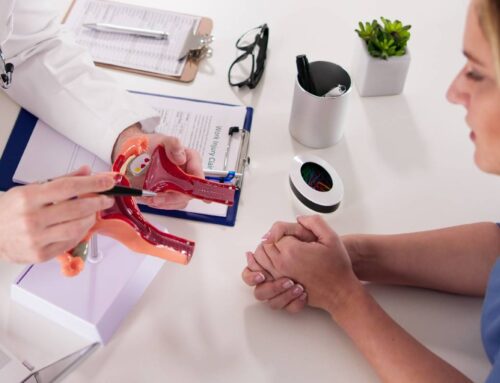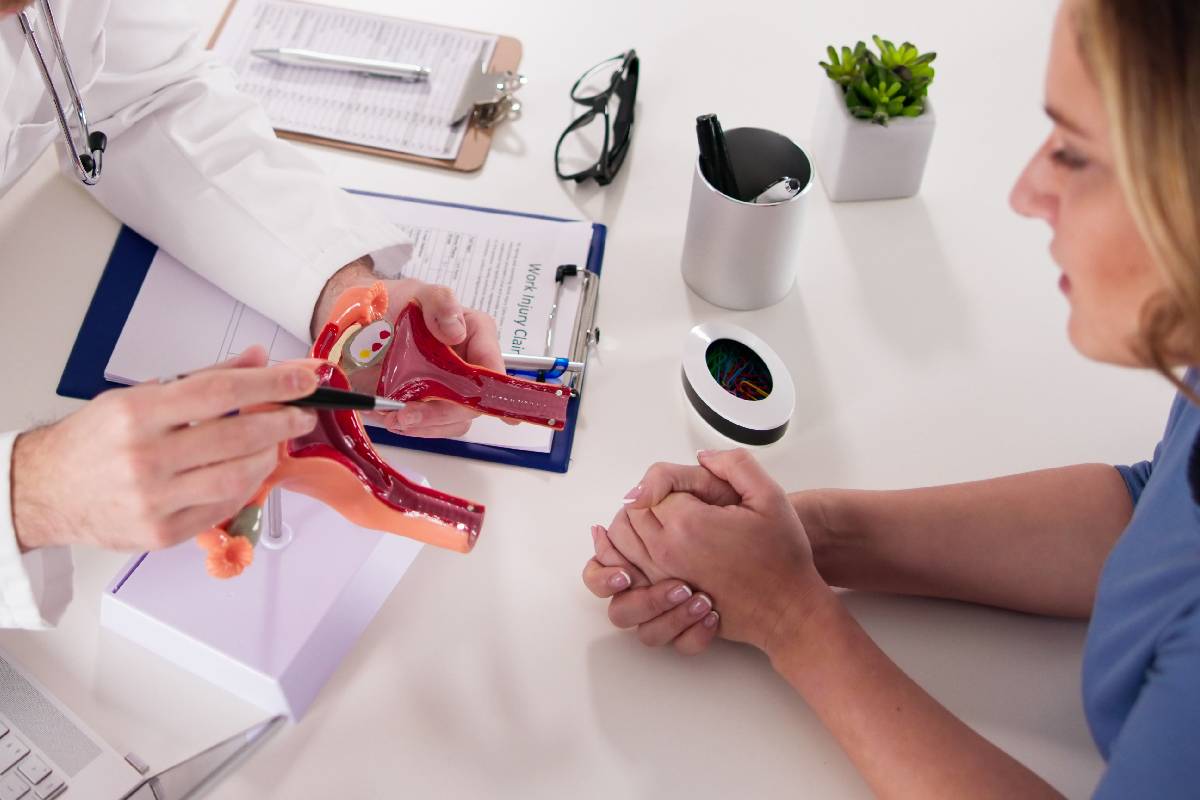
Gestational diabetes and preeclampsia are two significant pregnancy complications that can impact both maternal and fetal health. Understanding the connection between these conditions is essential for expectant mothers to manage risks and ensure a healthy pregnancy. A Woman’s Place in Naples, FL, is committed to providing expert care and guidance for women navigating these challenges.
What Is Gestational Diabetes?
Gestational diabetes (GD) is a condition in which blood sugar levels become elevated during pregnancy due to hormonal changes that affect insulin function. It usually develops after the 24th week and often resolves after delivery. However, unmanaged gestational diabetes can increase the risk of complications for both mother and baby, including:
- Excessive fetal growth (macrosomia)
- Increased likelihood of a C-section
- Low blood sugar in newborns
- Higher risk of developing type 2 diabetes later in life
What Is Preeclampsia?
Preeclampsia is a pregnancy-related condition characterized by high blood pressure and signs of organ damage, typically appearing after the 20th week. If left untreated, it can lead to serious complications, including:
- Preterm birth
- Placental abruption
- Long-term cardiovascular issues for the mother
- Eclampsia (seizures caused by severe preeclampsia)
How Are Gestational Diabetes and Preeclampsia Connected?
Research has shown a strong correlation between gestational diabetes and preeclampsia, with women diagnosed with GD facing a higher risk of developing preeclampsia. Several factors contribute to this link, including:
- Insulin Resistance and Inflammation – Both conditions involve insulin resistance and inflammation, which can contribute to endothelial dysfunction (problems with blood vessel health), increasing the risk of high blood pressure.
- Obesity and Excess Weight Gain – Being overweight or experiencing excessive weight gain during pregnancy is a shared risk factor for both GD and preeclampsia.
- Placental Dysfunction – Abnormalities in how the placenta develops and functions may play a role in both conditions, affecting blood flow and nutrient exchange.
- Metabolic and Cardiovascular Changes – Women with GD often have underlying metabolic conditions, such as high cholesterol and increased inflammation, which can contribute to hypertension and preeclampsia.
Reducing Your Risk
While not all cases of gestational diabetes and preeclampsia can be prevented, taking proactive steps can lower the risk:
- Monitor Blood Sugar Levels – Keeping blood sugar under control with a balanced diet and regular monitoring can help prevent complications.
- Maintain a Healthy Diet – Eating nutrient-rich foods, reducing processed sugars, and focusing on whole grains, lean proteins, and healthy fats can support metabolic health.
- Exercise Regularly – Moderate physical activity, such as walking or prenatal yoga, can improve insulin sensitivity and cardiovascular health.
- Attend Prenatal Appointments – Regular checkups help detect early signs of gestational diabetes and preeclampsia, allowing for timely interventions.
- Manage Weight Gain – Following recommended pregnancy weight gain guidelines can reduce strain on the body and lower the risk of both conditions.
Comprehensive Prenatal Care With Centering Pregnancy
A Woman’s Place is excited to bring Centering Pregnancy to Southwest Florida, an innovative program that enhances prenatal care through group support. Based on the nationally recognized model from the Centering Healthcare Institute, this program brings women due at the same time together in a comfortable group setting, offering increased education, connection, and support throughout pregnancy.
Benefits of Centering Pregnancy include:
- Reduced risk of preterm birth – A key factor in preventing complications related to gestational diabetes and preeclampsia.
- Lower stress levels – Emotional support from peers can help manage the stress that may contribute to these conditions.
- Increased rates of breastfeeding – Leading to better postpartum health for both mother and baby.
- Stronger friendships and community – Participants often form lasting relationships, extending beyond pregnancy and into parenting.
How It Works
- Sessions begin around 16 weeks of pregnancy and include 10 visits.
- Each session lasts about 90 minutes to 2 hours, providing 10 times more time with providers than traditional prenatal visits.
- Groups consist of 8-12 participants to foster discussion and shared learning.
- Jessica Fuentes, CNM, and Lori Votapek, APRN, facilitate the meetings, with OB physicians meeting each participant individually.
- No additional cost – Centering Pregnancy is covered by insurance as part of standard prenatal care.
- Location: A Woman’s Place at Cypress Way, 90 Cypress Way East, Suite 40, Naples, FL, 34110.
Each session includes traditional prenatal care along with education on topics such as:
- Nutrition and healthy weight gain
- Common pregnancy discomforts
- Stress management
- Labor and delivery preparation
- Breastfeeding and infant care
- Community resources
By participating in Centering Pregnancy at A Woman’s Place, expectant mothers can receive enhanced prenatal care that supports both their physical and emotional well-being while reducing the risk of complications like gestational diabetes and preeclampsia.
For more information, visit us at: https://www.awpnaples.com/portfolio-items/centering-pregnancy/
Further Reading: https://www.acog.org/womens-health/faqs/preeclampsia-and-high-blood-pressure-during-pregnancy
Gestational diabetes and preeclampsia are two significant pregnancy complications that can impact both maternal and fetal health. Understanding the connection between these conditions is essential for expectant mothers to manage risks and ensure a healthy pregnancy. A Woman’s Place in Naples, FL, is committed to providing expert care and guidance for women navigating these challenges.
What Is Gestational Diabetes?
Gestational diabetes (GD) is a condition in which blood sugar levels become elevated during pregnancy due to hormonal changes that affect insulin function. It usually develops after the 24th week and often resolves after delivery. However, unmanaged gestational diabetes can increase the risk of complications for both mother and baby, including:
- Excessive fetal growth (macrosomia)
- Increased likelihood of a C-section
- Low blood sugar in newborns
- Higher risk of developing type 2 diabetes later in life
What Is Preeclampsia?
Preeclampsia is a pregnancy-related condition characterized by high blood pressure and signs of organ damage, typically appearing after the 20th week. If left untreated, it can lead to serious complications, including:
- Preterm birth
- Placental abruption
- Long-term cardiovascular issues for the mother
- Eclampsia (seizures caused by severe preeclampsia)
How Are Gestational Diabetes and Preeclampsia Connected?
Research has shown a strong correlation between gestational diabetes and preeclampsia, with women diagnosed with GD facing a higher risk of developing preeclampsia. Several factors contribute to this link, including:
- Insulin Resistance and Inflammation – Both conditions involve insulin resistance and inflammation, which can contribute to endothelial dysfunction (problems with blood vessel health), increasing the risk of high blood pressure.
- Obesity and Excess Weight Gain – Being overweight or experiencing excessive weight gain during pregnancy is a shared risk factor for both GD and preeclampsia.
- Placental Dysfunction – Abnormalities in how the placenta develops and functions may play a role in both conditions, affecting blood flow and nutrient exchange.
- Metabolic and Cardiovascular Changes – Women with GD often have underlying metabolic conditions, such as high cholesterol and increased inflammation, which can contribute to hypertension and preeclampsia.
Reducing Your Risk
While not all cases of gestational diabetes and preeclampsia can be prevented, taking proactive steps can lower the risk:
- Monitor Blood Sugar Levels – Keeping blood sugar under control with a balanced diet and regular monitoring can help prevent complications.
- Maintain a Healthy Diet – Eating nutrient-rich foods, reducing processed sugars, and focusing on whole grains, lean proteins, and healthy fats can support metabolic health.
- Exercise Regularly – Moderate physical activity, such as walking or prenatal yoga, can improve insulin sensitivity and cardiovascular health.
- Attend Prenatal Appointments – Regular checkups help detect early signs of gestational diabetes and preeclampsia, allowing for timely interventions.
- Manage Weight Gain – Following recommended pregnancy weight gain guidelines can reduce strain on the body and lower the risk of both conditions.
Comprehensive Prenatal Care With Centering Pregnancy
A Woman’s Place is excited to bring Centering Pregnancy to Southwest Florida, an innovative program that enhances prenatal care through group support. Based on the nationally recognized model from the Centering Healthcare Institute, this program brings women due at the same time together in a comfortable group setting, offering increased education, connection, and support throughout pregnancy.
Benefits of Centering Pregnancy include:
- Reduced risk of preterm birth – A key factor in preventing complications related to gestational diabetes and preeclampsia.
- Lower stress levels – Emotional support from peers can help manage the stress that may contribute to these conditions.
- Increased rates of breastfeeding – Leading to better postpartum health for both mother and baby.
- Stronger friendships and community – Participants often form lasting relationships, extending beyond pregnancy and into parenting.
How It Works
- Sessions begin around 16 weeks of pregnancy and include 10 visits.
- Each session lasts about 90 minutes to 2 hours, providing 10 times more time with providers than traditional prenatal visits.
- Groups consist of 8-12 participants to foster discussion and shared learning.
- Jessica Fuentes, CNM, and Lori Votapek, APRN, facilitate the meetings, with OB physicians meeting each participant individually.
- No additional cost – Centering Pregnancy is covered by insurance as part of standard prenatal care.
- Location: A Woman’s Place at Cypress Way, 90 Cypress Way East, Suite 40, Naples, FL, 34110.
Each session includes traditional prenatal care along with education on topics such as:
- Nutrition and healthy weight gain
- Common pregnancy discomforts
- Stress management
- Labor and delivery preparation
- Breastfeeding and infant care
- Community resources
By participating in Centering Pregnancy at A Woman’s Place, expectant mothers can receive enhanced prenatal care that supports both their physical and emotional well-being while reducing the risk of complications like gestational diabetes and preeclampsia.
For more information, visit us at: https://www.awpnaples.com/portfolio-items/centering-pregnancy/
Further Reading: https://www.acog.org/womens-health/faqs/preeclampsia-and-high-blood-pressure-during-pregnancy









